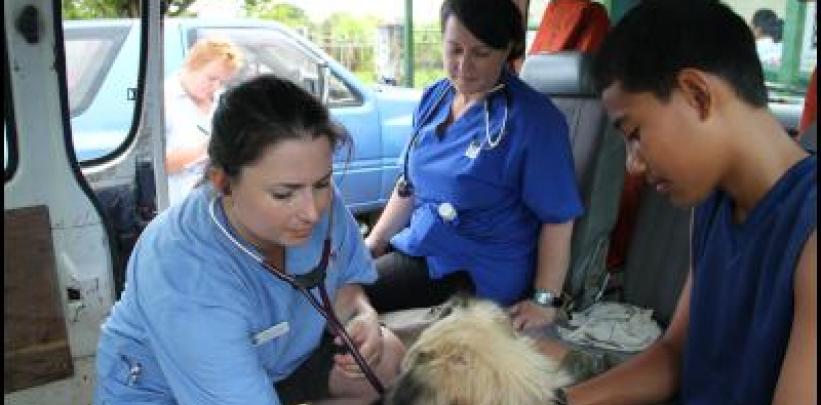Inside Story: Furry Friends In Tonga
A group of 14 certificate and diploma level students, and three teaching staff, travelled to Tonga’s main island of Tongatapu in 2016, where they visited Nukualofa and some of the smaller villages. It’s the fourth year Unitec has taken students to Tonga.
Unitec veterinary nursing students have recently returned from Tonga, where they set up a temporary veterinary clinic and treated, and sometimes operated on, the well-loved pets of owners who don’t usually have access to veterinary services.
“It was an intense and intensive experience,” says Natalie Coe, a first year veterinary student. “It was amazing, because even though we aren’t yet qualified veterinary nurses yet, we did everything that veterinary nurses do, in a much more concentrated way. We were thrown into the deep end, but everyone took it on board, got the work done, and learned so much.”
Amber Hislop was in her second year of veterinary nursing when she travelled to Tonga, and says students were able to perform procedures that they normally wouldn’t. While the prospect of these procedures might have made some nervous to begin with, they’d become second nature to them by the end of the week.
“You could see it among the first year students who learned so much by being in a clinic setting than you ever can in a lecture theatre. Some students hadn’t ever put a catheter in, for example, but they managed to get it in first go, and then were doing one after the other. You could see students developing so much confidence -- things can often seem so much harder on paper than it is in real life.”
Natalie agrees: “I’ve done over 300 hours in a vet clinic as a student, but what I did in Tonga in a week was more than I’d done in a year of practicum. Understandably, we don’t have that much responsibility as a first-year vet nursing student in New Zealand, but in Tonga we were doing it all.”
Over the years, Unitec students have done an eye removal, a few leg amputations, treated a pig that had been attacked, piglets with mange, sick puppies, horses, goats, ducks and roosters.
The trip is done in collaboration with South Pacific Animal Welfare (SPAW), a registered New Zealand charity which provides companion animal veterinary services such as de-sexing and vaccinations in the Pacific Islands.
Tonga has no regular companion animal vet, so the communities are reliant on SPAW trips for vaccination and de-sexing, as well as treating any sick and injured animals while the temporary clinic is in operation.
“The pet owners we were seeing in Tonga really do care about their pets, but they don’t have access to treatment,” says Amber. “If their dog is hit by a car, they can’t just take it to the vet. If it’s covered in fleas, they can’t just go and buy flea treatment. But if our pets get sick we’ve got clinics everywhere. We’re lucky to have that.”
Education is also a crucial part of the service, says Natalie. “People care for their pets, but often don’t have the resources or information on how to. One client was giving his dog Panadol, which is a no-no, because dogs can’t metabolise Panadol and the dog was really sick. So educating people about how to care for their pets is really key, and we’re starting to provide that.”
Both say they would go to Tonga again. “After going there, I definitely want to do more voluntary work,” says Amber. “It makes your job more worthwhile. And this is why I want to do this job, to make a difference.”
Animal Health and Welfare Study Vet Nursing Order Study Guide
